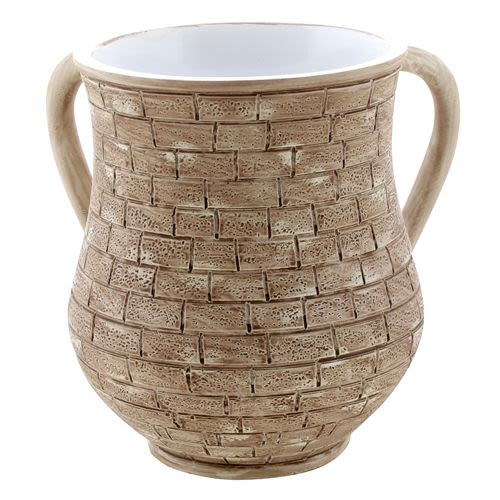
Nasso: Spiritual Growth
To escape this snare, the Torah hints that one should abstain from wine and encourage one’s spiritual impulses in order to escape...

The Nazirite and the Sotah
“Hashem spoke to Moshe [Moses] saying: ‘Speak to the children of Israel, and say to them: A man or woman who sets himself apart by making a Nazirite vow to abstain for the sake of Hashem…’” (Bamidbar 6:1-2).
The Torah provides an avenue for a man or woman to voluntarily adopt the status of a Nazirite, which includes three restrictions:
a) A Nazirite is forbidden to eat or drink grapes or grape products for a period of time, at least a month;
b) A Nazirite’s hair may not be cut during the period of his oath; and
c) A Nazirite may not become impure from touching or being in the same room as a human corpse.
This should not be understood as merely a list of prohibitions. Nazirut (Nazirism) is a state of holiness, and the individual laws stem from this elevated status. The Nazarite adopts a state of holiness, and the Torah dictates that such holiness is incompatible with those forbidden activities (Maharit 1:543).
“Why is the section dealing with the Nazirite juxtaposed to the previous section of the sotah, the wayward wife? To tell us that whoever sees a sotah in her state of degradation should vow to abstain from wine, for it leads to adultery” (Rashi, based on Sotah 2a and Midrash Rabbah 10:2-4). This sheds light on the underlying purpose of the Nazirite status and what would move someone to adopt it.
In Bamidbar (5:11-31) we learn of the sotah, who behaved improperly and gave her husband good reason to suspect her of adultery, but there is no proof of either guilt or innocence. The Torah provides a miraculous process: The ordeal of the bitter waters. This will either prove that she sinned and subsequently result in the death of both she and her illicit lover, or show conclusively that she was faithful and thereby restore trust and love to the marriage.
A sotah opted to follow her sensual passions and let her heart overpower her mind, and her pursuit of pleasure overcame her responsibility to God. Her experience was proof that people are easy prey to temptation and that when the yetzer hara, the evil inclination, rages within, even adultery can be seen as an acceptable course of action. Someone who saw her degradation – even her grotesque death after she drank the bitter waters – could still easily be overcome by the fantasies of temptation, for human imagination is easily stimulated.
To escape this snare, the Torah hints that one should abstain from wine and enhance and strengthen one’s spiritual impulses in order to protect one from falling prey to such illicit behavior. The Nazirite’s adoption of a spiritual life closes the door to the enticement that doomed the sotah (Artscroll Chumash).
Even the Great
“Whoever sees a sotah in her state of degradation should vow to abstain from wine” (Rashi).
Rabbi Meir Robman, in Zichron Meir, points out that Rashi's words, “Whoever sees,” includes even a person who is completely righteous and pious. Why should such a person have to vow to abstain from wine? Are we to think that a person on a high spiritual level would learn from the deeds of a lowly, fallen individual?
The Talmud is teaching us that when a person sees the sotah in her state of degradation, he or she must carefully think about what is transpiring before his or hers eyes. This woman did not fall in one fell swoop, nor was she born corrupt and treacherous. She was a moral Jewish woman who gradually deserted the path of righteousness until she reached such a lowly state. Perhaps she drank a little too much wine at innocent social gatherings, perhaps even from Kiddush or Havdalah, and allowed herself to be drawn after the intoxicating pleasures until she fell into the pit of adultery.
Even the greatest person should be frightened by the chain of events that led to the sotah's degradation. Everyone, even the most righteous individual, is mortal, and not an angel. Therefore, a person who sees a sotah in her degradation should undertake to distance himself from the cause of the events that leads to these circumstances and vows to abstain from wine for a time. It's simply a matter of taking precautions.
Make a Fence
The Torah instructs the Nazirite: “He shall abstain from new wine and aged wine; he shall not drink even vinegar made from new wine or aged wine, nor shall he drink anything in which grapes have been steeped, and he shall eat neither fresh grapes nor dried ones” (Bamidbar 6:3).
Mesillat Yesharim (Chapter 11) regards these restrictions as the prototype of prohibitions that the Torah commanded the Sages to institute as protective fences around the Torah's negative commandments. This is elucidated in Pirkei Avot (1:1): “The Men of the Great Assembly would always say these three things: Be cautious in judgment; establish many pupils; and make a safety fence around the Torah.”
The primary prohibition is to abstain from wine, but the Torah added the additional prohibitions against consuming any grape products, lest the Nazarite be in the proximity of foods that will tempt him to drink the forbidden beverage.
One might ask: Aren’t these fences like crutches? If a person was really committed, shouldn’t he be able to avoid temptation? Underlying these questions lay two different views about the development of spiritual strength.
What is more valuable — to rise to the occasion and overcome a swell of temptation, or to cunningly thwart the exposure to temptation in the first place? Let us take the example of a diabetic, for whom an intake of sugar could be life threatening. Unfortunately, our valiant friend has a tremendous craving for chocolate. To further complicate matters, he works in an office just a few doors away from a gloriously aromatic chocolate store.
On his way to work he could take the direct route and walk past that chocolate store, and, with superhuman, push back the temptation, day by day, week by week. Or, he could take a surreptitious detour, around the block, through the back door, and avoid the tempting aromas and the sight of his favorite chocolates attractively arranged in the store's display window. Which route allows him to grow more in his resolve to avoid temptation and choose life?
“Make a safety fence around the Torah.” The section of the Nazirite teaches us that the highest expression of our free will is to choose to avoid temptation!
Up the Down Staircase
Rabbi Robman writes that the Nazirite’s preponderance of prohibitions is directly related to his desire for spiritual ascent. “Who will ascend upon Hashem’s mountain and who will stand in His Holy place?” (Tehillim 24). Yet it is difficult to achieve spiritual growth, to ascend upon Hashem’s mountain, but it is no less difficult to maintain our spiritual growth, and to continue to grow further from that place which we've achieved. This is what Dovid HaMelech (King David) called: “who will ascend” and “who will stand.”
We may put sincere efforts into our growth until we “ascend upon Hashem’s mountain,” but once we are there, we tend to rest on our laurels, declaring that we’re “happy with our portion,” and cease to try and grow beyond the point of complacency or stagnation that we have reached.
Spiritual ascent is similar to walking up the down escalator. As long as we make the effort, we will ascend. But if we kick back and relax, we automatically descend. Only angels are described as “standing,” fixed in their place. Human beings, however, are always in motion, either climbing up or falling down. This is the world of movement and hopefully we are heading in the right direction.
The Handsome Nazirite
Shimon HaTzaddik (Simon the Just) said: "In the whole of my life, I never ate of the guilt-offering of a Nazirite, except in one instance. [He was concerned that the Nazirites were insincere]. There was a man who came to me from the South, who had beautiful eyes and handsome features with his locks heaped into curls. I asked him: 'Why, my son, did you resolve to destroy such beautiful hair?'
[At the conclusion of the period of Nezirut, the Nazirite brings a series of offerings – a male lamb as a Burnt Offering, an ewe lamb as a Sin Offering, and a ram as a Peace Offering. The Nazirite’s hair, which had grown freely throughout the Nezirut, is now completely shorn and burned in the fire beneath the Peace Offering.]
“He answered: 'In my native town, I was my father's shepherd, and going down to draw water from the well, I saw my reflection in its waters. My heart leaped within me and my evil inclination assailed me, seeking to compass my ruin, and so I said to it: "Evil one! Why do you plume yourself over a world that is not your own? For your end is but worms and maggots. I swear that I shall shear these locks to the glory of Heaven!”
“Then I rose, and kissed him upon his head, and said to him: 'Such as you, may there be many Nazirites in Israel. Of one such as yourself does the verse [Bamidbar 6:2] say: "A man or woman who sets himself apart by making a Nazirite vow to abstain for the sake of Hashem”’” (Nazir 9b, and Sifri). [Translation from chabad.org]
Rabbi Yaakov Yisrael Kanievsky, z"tl, known as The Steipler, explains that this wonderful story is teaching us about the prime deterrent to spiritual growth — arrogance. When the shepherd from the South saw his reflection, his handsome features caused him haughty thoughts, as he said: “Why do you plume yourself?”
Shimon HaTzaddik recognized his unique spiritual greatness, for when the shepherd sensed a tiny drop of arrogance in his thoughts he immediately undertook a course of action for spiritual protection and hence spiritual growth by becoming a Nazirite (Birchat Peretz).
Living in a generation of instant gratification poses many challenges to our desire for spiritual growth. Similar to the one who sees a sotah in her degradation, we are unwilling witnesses to a world wide moral deterioration. We should learn from the laws of the Nazirite to build effective safety fences for our spiritual health, and become inspired to steadily advance, step by step, up the escalator of spiritual growth.










Tell us what you think!
Thank you for your comment!
It will be published after approval by the Editor.